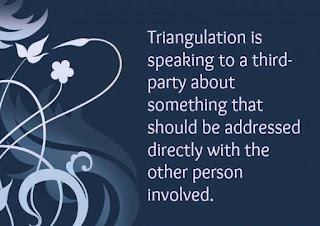Thou Shalt Not Triangulate
An old piece of relationship advice begins this way:
“If your brother sins, go and show him privately his fault.
If he listens to you, you have won your brother over. But if he does not
listen, take one or two others along, so that ‘every matter may be confirmed by
the testimony of two or three witnesses.’”
Even though that’s from the eighteenth chapter of the Christian
Gospel of Matthew, I’ve known Christian clergy who don’t follow that wise
advice. Instead they practice what many do in a variety of human relationships
– triangulate.
As a concept, triangulation originated in research and
discussions about dysfunctional families. Parents might often complain to a
child about their spouse, for example, bringing the child into the adults’
problem.
But it applies quite often within numerous friendly,
romantic, social, and business relationships. And it has helped bring down some
very good organizations from churches to non-profits.
Someone has something against someone that might even be
legitimate, but instead of talking to the person with whom they have a problem,
they gather together others to discuss the person and their problems. It’s like
recruiting a team of people to agree with you, and in doing so it broadens what
is first always an issue between two people into a problem of a group.
The wider the group, the better the triangulator feels about
the strength of the complaint. Rather
than communicating directly with each other, triangulators use a third party or
a larger group to bolster themselves. It feels easier to do this than to do the
difficult, healthy work of that old advice.
There’s
fear involved in such moves. Gathering people in agreement makes someone’s criticism
feel more justified and gives them greater courage of their convictions. Going
it alone is, well, lonely. Not only misery, but criticism really, really loves
company.
And the result could be an ally, or two, or three, or more
on ones side who can gang up on the person we should talk to first alone, and
even the second time directly. Talking to others rather than going to the
object of the complaint is about our insecurities and fears, not those of
others.
We often do this because we have already given up on the
idea that the person we should talk to first by ourselves, will react the way
we think they should. That person might come back with their own version of
what happened.
Yet that would be the beginning of healing in relationships.
Listening carefully to each other is a key to doing so; and understanding the
perspective of the other person helps us see how that person might see
everything differently.
But oh, no. It might actually make us question what our own
interpretation was. It might threaten the courage we would otherwise build up
among our recruited team.
Triangulation as an activity means we have given up on the
other person. We might think that group pressure will be required to change
them or correct them, but it means we have already given up on our individual
relationship with that person.
It tells us a lot about the relationship we have. It’s not
one of love, friendship, honesty, or depth.
Triangulation is something we do when we ourselves don’t
want to be vulnerable. It’s what we do when we’re afraid of the response of the
other and how it would challenge us.
Unless we reject triangulation, we will find that the
relationships that need our attention and effort, whether they are friendships
or others, will never grow. It also means we have chickened out in the work of
our own relationship growth.
If we reject triangulation, we have the opportunity to move
into deeper and more valuable relationships. And we will have also made it
clear that we expect those with whom we have a relationship not to triangulate
behind our own backs either.




Comments
Post a Comment